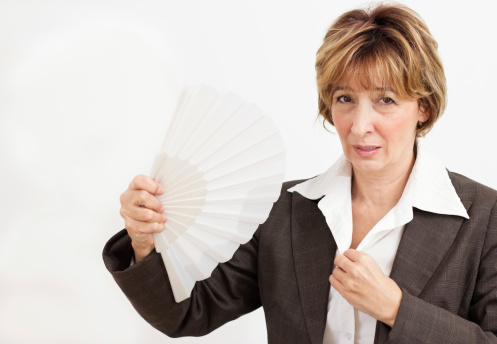
Menopause and Hot Flashes
A hot flash is a short sensation of heat that can come at anytime during the menopause stage in a woman’s life. It can include sweats and even be accompanied by a red, flushed looking face. Some women experience a more rapid heart rate followed by chills. Night sweats can occur with hot flashes as well and often interfere with sleep. It can be a difficult and frustrating time in a woman’s life.
The Mediterranean Diet
Mediterranean diet focuses primarily on plant-based foods like fruits and vegetables, whole grains, legumes and nuts. Butter is normally replaced with healthier fats such as olive oil. Very little salt is used to flavor food, since various herbs and spices are added instead. Red meat is kept to a minimum; however, fish and lean poultry are consumed two or three times a week.
Fruits and vegetables are known to be packed full of vitamins, minerals and antioxidants. These fresh foods included in Mediterranean diets have also been associated with a lower level of bad cholesterol; the type of cholesterol that is likely to build up deposits in our arteries and potentially contribute to cardiovascular diseases.
How a Mediterranean Diet Can Help With Hot Flashes
A recent study involved six thousand women who were monitored over nine years, and aimed to see if a Mediterranean diet can reduce the occurrences of hot flashes. Those who closely followed the Mediterranean diet were 20 percent less likely to report hot flashes. Women who were in menopause and ate high-fat diets were 23 percent more likely to experience hot flashes and night sweats.
The study conducted in Australia through the University of Queensland could not specify exactly which foods prevent the flashes, but the researchers say that it is possible that low-fat diets help stabilize estrogen thus easing hot flashes. Eating a Mediterranean diet could also place blood sugar within a normal range, keeping symptoms of menopause to a minimum.
The authors of the study admit that not enough research has been done to start offering recommendations to women with menopause; however, they do remind people that a lot of research already exists to support that a Mediterranean-style diet has many health benefits. They say for this reason, adopting it at any point in life is a good idea.
Preventing Hot Flashes
While research continues in the connections between food and flashes, there are other steps women can take to lessen the effects of menopause. It may not be possible to completely eliminate hot flashes during menopause, but there are triggers that can cause them to occur more frequently. Doctors recommend avoiding the following during menopause:
- Stress
- Spicy food
- Caffeine
- Cigarette smoke
- Alcohol
Some women say keeping their room cool at night and using a fan during the day is good is helpful with hot flashes. Wearing light layers of clothing with natural fibers like cotton will make you more comfortable should a hot flash suddenly come on.
Related Reading: Natural health: Best herbs for women